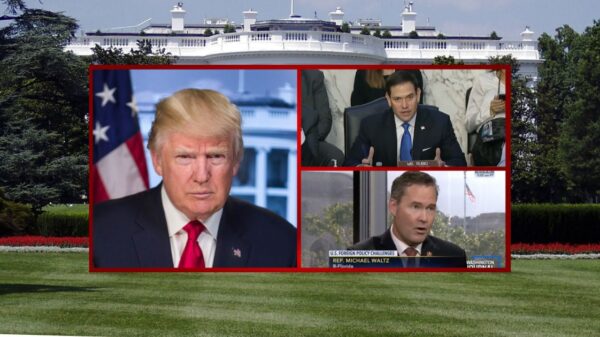This week, U.S. Sen. Marco Rubio, R-Fla., joined U.S. Sens. Jim Risch, R-Idaho, Jim Inhofe, R-Okla., Pat Toomey, R-Penn., and Rob Portman, R-Ohio, sent a letter to President Joe Biden outlining Republican policy on effectively addressing the challenge posed by Iran as the administration seeks to re-engage with the Iranian regime.
The full text of the letter is below.
Dear Mr. President:
This February marks the 42nd anniversary of the Islamic Revolution in Iran, which significantly altered U.S. policy in the Middle East and immediately made the world more dangerous. Despite early agreement on confronting the Iranian regime, substantial shifts in U.S. policy between Republican and Democrat administrations have cast doubt on American coherence to confront the Iranian challenge. Your administration is presented with a unique opportunity to forge a bipartisan approach that could safeguard U.S. national interests for the long term. We urge you to truly seek this bipartisan congressional support for U.S. policy on Iran, and want to present our views of an appropriate Iran policy moving forward. Absent this consensus, Iran policy will continue to be used as a political football between parties and we will fail to uphold the security interests of the United States and our allies.
First, the United States requires a holistic strategy that incorporates all instruments of national power. Your administration’s Iran policy must encompass more than a nuclear negotiation. We need consensus on the strategic aims of U.S.-Iran policy and should allocate resources accordingly. Specifically, we believe that our strategic aim is to halt the Iranian regime’s nuclear ambitions and end its destabilizing activities in the region and beyond. To be successful, any negotiation with Iran should be combined with efforts to expand the Abraham Accords, ensure sufficient U.S. deterrence in the region against further attacks, continue to build partner capacity to address the Iranian threat, support reforms that reinforce regional sovereignty, and explore multilateral security arrangements built around like-minded partners.
Second, the United States should not rejoin the 2015 Joint Comprehensive Plan of Action (JCPOA). The JCPOA remains riddled with problems, including arbitrary sunsets. In addition to the expired conventional weapons and ballistic missile bans, the original deal contained a “Transition Day” in 2023 and “Termination Day” in 2025. These arbitrary dates provide Iran with additional sanctions relief, trigger the United Nations (UN) to lift missile restrictions and eventually absolve the UN of any responsibility regarding Iran’s nuclear program under UN Security Council Resolution 2231. These deadlines were far too short in the original deal and are unrealistic now. Any future agreement must contain these bans and ensure they are long enough to guarantee Iran will not use these tools to threaten its neighbors.
Third, the scope of any agreement with Iran must address the full range of Iranian conduct, including regional terrorism, ballistic missiles, and the detention of U.S. nationals. It comes as no surprise that Iran’s proxies support Assad’s ongoing atrocities in Syria, attack our troops and diplomats in Iraq, have driven Lebanon to the brink of collapse, threaten our Israeli and Gulf partners, and contribute to the world’s largest humanitarian disaster in Yemen. Despite criticism of the “maximum pressure” campaign, there is no denying that it has inflicted a cost on Iran for its malign activities and now presents your administration with leverage to obtain a better deal from Iran.
We know that Iran cannot be trusted to honor its commitments. Your administration’s plans to address ballistic missiles and regional terrorism on follow-on agreements risks repeating the mistakes of the JCPOA, after which these promised agreements failed to materialize. Further, if the United States provides financial relief in return for commitments associated with Iran’s nuclear program, it is highly unlikely that the United States will have sufficient leverage for follow-on agreements. These issues must be addressed simultaneously.
Fourth, the United States should not submit to artificial urgency or deadlines, but should take a measured and deliberate approach with Iran. There are those that point to recent Iranian nuclear advances and the regime’s pending elections as reasons to act quickly. We should not reward Iranian nuclear non-compliance, as alarming as it is, by rushing to accept another flawed agreement. Likewise, regardless of whatever the election’s outcome, any agreement will need to pass through the Ayatollah. A measured approach, along with associated consensus building, outweighs the argument to move quickly.
Fifth, the Biden Administration must engage in extensive, formal consultations with Congress, Israel, and our Gulf partners. Congressional buy-in will ensure that a future agreement has the longevity to survive successive administrations. The failure of the Obama Administration to secure bipartisan consensus behind the JCPOA doomed the deal when a Republican became president. On the regional front, Israeli and Gulf views must be central to the administration’s approach, and the administration must take into account the very real concerns of those that actually live under the shadow of the Iranian threat. In all of these cases, consultations must be more than perfunctory. They must be formal, extensive, and responsive to stakeholders. Congressional consultations to date have not met this standard. And we must always keep in mind that regardless of what we or any other nations do, Israel has its own existential threat perception that guides its decision-making regarding Iran and will always act as it sees fit to protect itself, notwithstanding any agreements other parties make, including the United States.
Sixth, under no circumstance should the United States agree to any financial relief to the regime as a precondition for negotiations, including sanctions relief or efforts to facilitate the un-freezing of Iranian funds in other countries. JCPOA-provided relief taught us hard lessons on Iran’s spending priorities. Despite promises that the regime would use sanctions relief to repair its beleaguered economy, the regime instead directed funds to its defense budget and regional proxies. Sanctions relief supercharged Iran’s malign activity instead of fostering moderation. In addition, the regime has continued to brutally repress the Iranian people.
It is appropriate to note that the Iranians have started to test your administration and “push the envelope” to probe your tolerance for their malevolence. On Monday, February 15, Iran caused 14 missiles to launch against a U.S. installation in Iraq, killing a contractor and seriously injuring Americans. Three days later, on February 18, your administration announced it would negotiate with the Iranians. In return, the Iranians announced they would step up enrichment on February 22, and on February 23, announced they would bar snap inspections by the International Atomic Energy Agency. This is clearly a test of your administration.
Iran poses a serious threat to U.S. national security and the security of our allies and partners around the world. As your administration develops its approach to Iran, it has an opportunity to establish a measured timeline, build critical consensus, and ensure that any future agreement addresses vital U.S. national security interests and survives the next change in administration. The American people and our allies and partners deserve no less. We look forward to consultations on this very important matter.

















